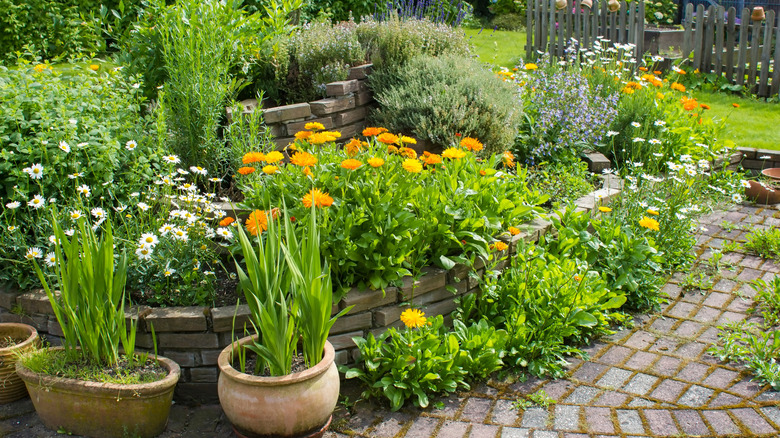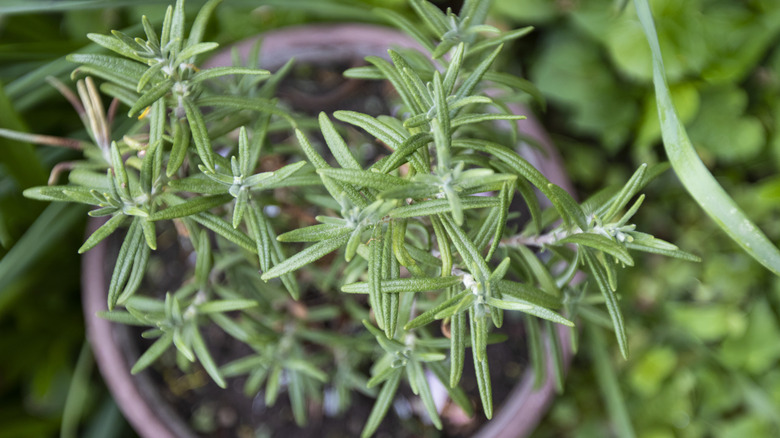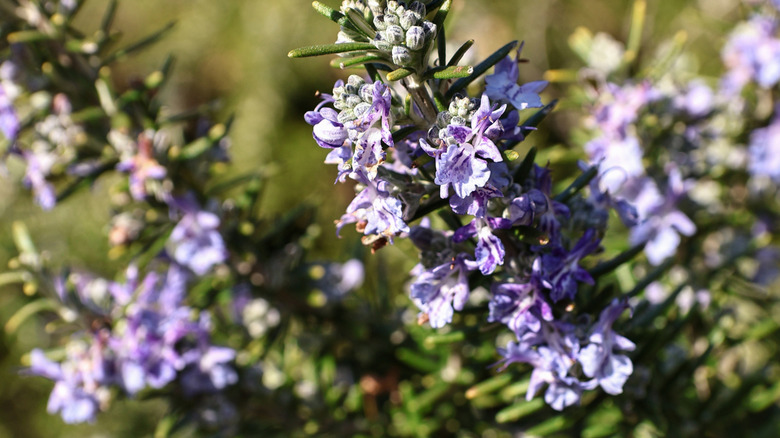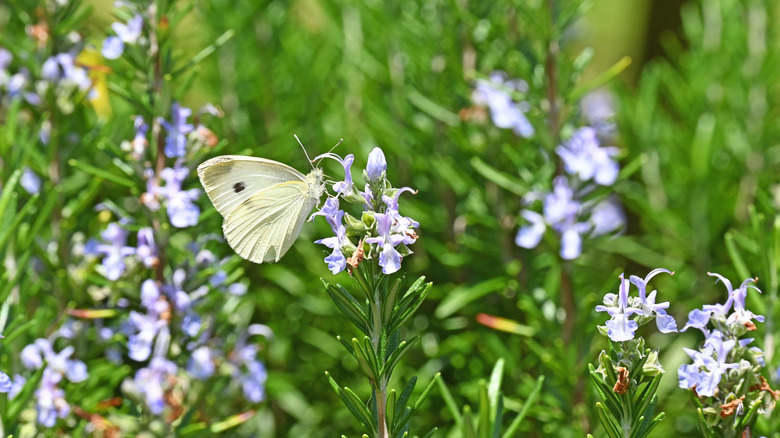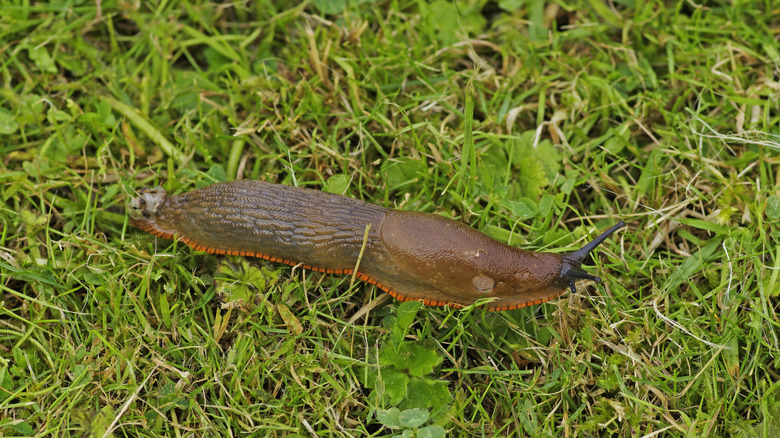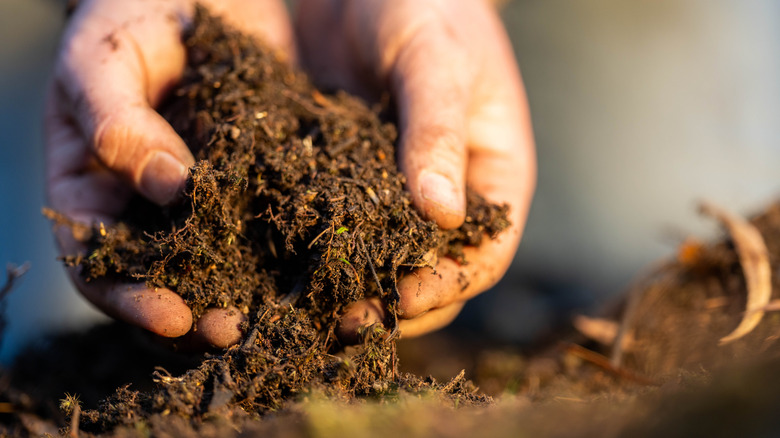The Herb That's Known For All Of Its Benefits In The Garden
There are many herbs that you can plant in your garden that provide a range of benefits for your plants, your kitchen, and even your health. However, there is one in particular that is known for all of its benefits in the garden: rosemary (Salvia rosmarinus). You may be familiar with the many uses for rosemary in the kitchen. Or perhaps you already know that there are several medicinal benefits to consuming rosemary or using it in aromatherapy. But did you know that it is one of the most beneficial herbs in your garden, too?
Not only is rosemary easy to grow and long-lasting, it also provides a range of other benefits for the plants and soil in your garden. It is great for companion planting—particularly with certain vegetables—and it attracts beneficial wildlife while deterring harmful pests, including insects, deer, and rabbits. Plus, it can improve soil quality while surviving periods of drought. When planted in the ground, rosemary thrives in USDA Hardiness zones 8 to 10. Overall, caring for your rosemary herb plant is an easy way to add value and protection to your garden for years.
Harvest as a low-maintenance herb
Rosemary is considered a low-maintenance herb that can produce several harvests per season for several years. Depending on the variety, you can start harvesting cuttings within the first year of growth. You can plant from seed or propagate from cuttings. To plant rosemary, you just need to prepare the soil, pay attention to temperature, and give it enough space. It rarely needs fertilizer or water, so once it is planted, there isn't much to do to care for it except pruning. Overwatering and frost can kill your rosemary, so be sure to avoid both. There are even several foolproof ways to bring dying rosemary plants back to life.
Add interest and natural fragrance to your garden
Rosemary is beneficial for creating a garden haven that not only looks nice, but smells wonderful. Its evergreen leaves provide your garden with long-lasting foliage that blooms with purple flowers in the spring and summer. Because of its versatility, rosemary can be planted in a wide range of gardens, including vegetable gardens, border gardens, rock gardens, recreation areas, patios, or in containers. As part of the mint family, it also provides a fragrant aroma that fills the air with a pleasant, earthy, herbaceous scent.
Attract butterflies, bees, and birds to your garden
Beyond the benefits rosemary offers for gardeners themselves, it is beneficial for the rest of the garden as a plant to attract pollinators and beneficial wildlife. When left to flower in the spring and summer, rosemary attracts butterflies and bees, which pollinate other plants in the garden. It is also a favorite among some species of hummingbirds. In the fall, when the plant goes to seed, it attracts birds such as goldfinches, who feed on the seeds.
Control pests naturally
Perhaps one of the best benefits that rosemary can offer for your garden is in the form of pest control. That's right, you don't need to invest in expensive, potentially harmful chemicals to keep pests away; just consider the most ideal time of year to plant pest-repelling rosemary in your garden and enjoy the results. Rosemary is widely recognized for deterring pests such as Japanese beetles, slugs, and snails due to the fragrant oils secreted by the leaves. Plus, it can even keep mosquitoes out of your yard!
Stabilize soil and control erosion
Rosemary can be planted in any type of soil, except for clay soil, as long as it isn't too wet and has a pH between 6.0 and 7.0. However, it can provide certain benefits to specific soil types because it is known to stabilize soil and provide erosion control. Trailing rosemary (Rosmarinus officinalis) is particularly useful for stabilizing banks. Rosemary, in general, has woody roots that penetrate deep into the soil, creating an anchor for the plant while controlling erosion by holding the soil together.
Deter deer and rabbits from your garden
Insects aren't the only pests that rosemary can keep out of your garden. Deer and rabbits don't like the scent of rosemary either. Deer also don't like the taste of rosemary, so the plant is generally resistant to deer damage. The strong fragrance provides deterrent benefits to the surrounding plants as well. Plus, the scent gets stronger under drought conditions, keeping them away when they may be even more desperate for food.
Maintain a thriving garden in times of drought
Another fantastic garden benefit that rosemary offers is the plant's resistance to drought. In fact, it prefers drier soil because wet soil conditions can quickly cause root rot. This makes it particularly beneficial for planting in areas with lower-quality soil or dry conditions. Because of these qualities, it is commonly used in rock gardens, sandy soils, or drought-tolerant gardens.
Offer a companion plant for vegetables
Due to all of these individual benefits, rosemary is a fantastic herb to pair with vegetable plants. Companion planting is the practice of strategically planting vegetables, herbs, and flowers near other varieties that are mutually beneficial. Rosemary provides a range of obvious benefits, including improvements to soil quality, pest control, and more, while gaining nutrients from nearby plants. Veggies that grow better with rosemary nearby include cabbage, broccoli, cauliflower, collards, beans, garlic, and carrots.
